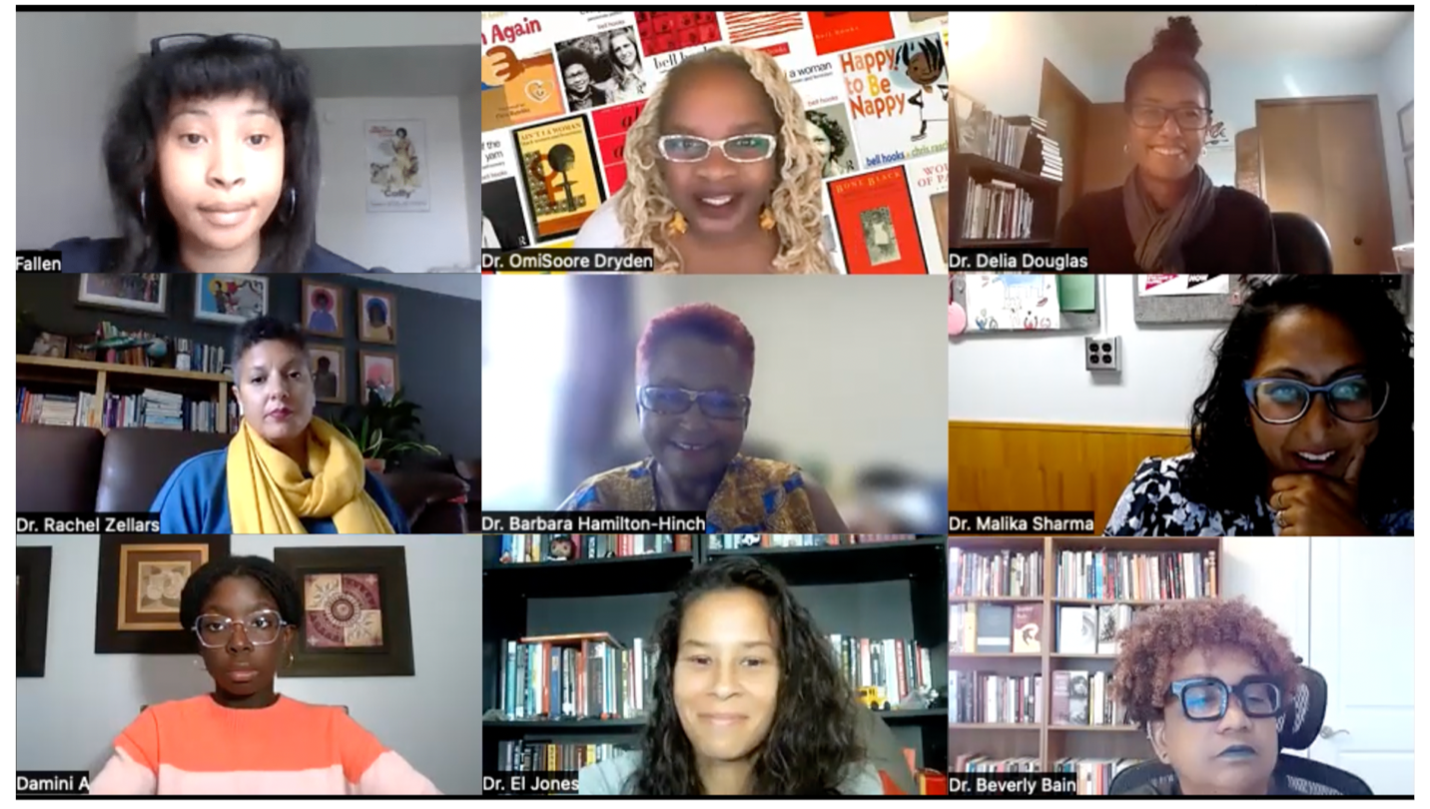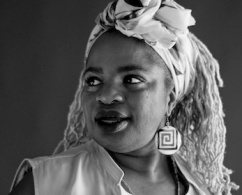Celebrating bell hooks’ 70th Birthday
November 17, 2022
bell hooks died on December 15, 2021. Her death was a loss to the world, to those who benefitted from her community work and those who benefited from her scholarship, specifically, her death was a loss to Black people, Black feminists, and feminist communities. In honour of bell hooks, Dr. OmiSoore Dryden hosted a teach-in on September 26, 2022 – what would have been bell hooks’ 70th birthday. Why a teach-in? Teach-ins are an informal, action-oriented discussion and was the best way we could acknowledge bell hooks and her work in Black communities and Black feminist thought and pedagogy.
Who is bell hooks? bell hooks (all lower case) was an influential thinker, theorist, cultural critic, community worker, and community thinker. I first became familiar with her work as an undergraduate student, through her book, Ain’t I a Woman: Black women and Feminism. I had the opportunity to hear bell hooks speak over the years and attended two of her book launches held at the Toronto Women’s Bookstore. In her book, Teaching to Transgress (Dal library access), bell hooks, drawing on Paulo Freire, reminds us that education is a practice of freedom. hooks also states that “the classroom remains the most radical space of possibility in the academy” and I bring this commitment with me into the classroom, including that of medicine and my engagement with medical students.
It was a pleasure to invite 8 friends and colleagues, both thought leaders and activists, to share their thoughts and reflections on bell hooks and her contributions to practices of liberation.

Fallen Matthews, an interdisciplinary Doctoral Student at Dalhousie (Cinema and Media Studies/African American/Canadian history) spoke about hooks’ book Where We Stand: Class Matters (Dal library access). Fallen engages hooks’ descriptions of individualism as hegemonic and bred by supremacy to inauthentic institutional equity, diversity, inclusion, and accessibility (EDIA) initiatives; discussed the ways EDIA limits, steals, and appropriates the agency of marginalized positionalities; and how EDIA is often divorced from any politic that aims to address or redress the material effects of oppression, like anti-Blackness. Fallen spoke of the complexities of being a Black academic elite and urged people to move beyond intent and performativity to ensure opportunity and inclusion because the academies do not normalize this – and even justifies our exclusion. Such a powerful presentation! (Listen from 12:41 in the recording)
Dr. Barb Hamilton-Hinch is Dalhousie’s Assistant Vice‑Provost Equity and Inclusion, and shared that hooks’ reflections on Black women’s positionality on the margins of both civil rights and women’s rights movements were particularly helpful while writing her dissertation. Using hooks’ work, Dr. Hamilton-Hinch reflected on where we want to be as Black women in the academy and found validation within her own experiences. Dr. Barb explained that throughout her PhD there were not many Black academics to serve on thesis committees and there was a lack of understanding about intersectionality. She also spoke about the importance of challenging folks who claim they “don’t see Blackness” because seeing Blackness means seeing our struggles, resistance, and strength. (18:08)
Dr. Delia Douglas is the Director of the Office of Anti-Racism at the Rady Faculty of Health Sciences at the University of Manitoba. Dr. Douglas spoke to how hooks’ concepts were integrated within her PhD about migration politics, relocation and belonging across four generations of her family. Dr. Delia showed us her well used copies of hooks’ book, including one book with a broken spine – a testament of her fondness of hooks’ scholarship! She stated that when thinking of bell hooks, the words “accessible”, “curious”, “vulnerable”, “intimate”, “poignant”, and “courageous” came to mind. Dr. Delia admired hooks’ courage in terms of her assertion that Black women were sentient critical thinkers & knowledge producers. She also appreciated hooks’ different styles of communication and expression to a variety of audiences, the intimate way she was able to theorize daily life, as well as her ability to connect thoughts and ideas. In order to eliminate racial inequality and injustice we must recognize the interconnectedness of these systems of domination, and challenge these divisive hierarchies of oppression, because our lives, our struggles, our futures, and our liberation are linked! (22:07)
Damini Awoyiga is a fifteen-year-old spoken word poet, writer, activist, fashion designer, singer, and art illustrator. Damini is the founder of the Afro-Indigenous Book Club, a book club she created to encourage young people to read books written by Black and Indigenous authors and to share the realities and experiences of Black and Indigenous people in Canada. Damini shared that she read Feminism is for Everybody: Passionate Politics (Dal library access) and particularly enjoyed hooks’ attention to intersectionality and her comments on ending the division between women inside of feminism. Damini felt inspired by this book to think critically about what feminism means to youth today. The quote “feminists are made, not born” particularly stuck out to Damini. She shared two beautiful poems she wrote, inspired by bell hooks’ work. (29:11)
Dr. Malika Sharma is an Infectious Disease physician, HIV specialist, and clinician teacher in Toronto. Dr. Sharma describes bell hooks’ impact as changing the trajectory of her life in ways both big and small. She shared that hooks’ work deepened her understanding of patriarchy and relationships, which gave her confidence to pursue an MEd, informed her growth-centered clinical teaching, and made her think about self-care and the place for love to exist within clinical settings. Dr. Malika lives by hooks’ quote, “Integrity occurs when there is congruence between what we think, what we say, and what we do.” In everything she does – professionally, politically, as a mother – she asks herself “is it meeting those criteria?” Dr. Malika also acknowledged her positionality engaging with hooks’ work as a woman of colour who has not experienced anti-Black racism. When learning from and applying hooks’ work, she constantly reflects by asking herself, “Is this for me? Am I appropriating? Am I doing justice to her work?” (34:04)
Dr. Rachel Zellars, a lawyer and professor at St Mary’s University, shared that she initially engaged with hooks’ work by reading Ain’t I a Woman: Black women and Feminism as a freshman at Howard University. She learned three lessons from this book: 1) how to navigate the world with a deeper grasp of the tropes produced during slavery about Black women; 2) an understanding of how white women were invested in white supremacy; and 3) a critique of Black nationalism and the patriarchy at its roots. Dr. Rachel shared that prior to reading hooks’ she had been shaped profoundly by Malcolm X, the Black Panther Party, and the Black Power Era. She shared that hooks gave her permission to love Black people but to also be frank and hold to account Black men for the violence they commit upon us – sharing that the violence against Black women is at the root of our communities and is the thing that will prevent us from ever thriving in a white supremacist world. (42:46)
Dr. El Jones is an activist, journalist, and professor at Mount Saint Vincent University. Dr. Jones had a different trajectory with bell hooks, describing that as a young feminist activist she was not very interested in hooks’ work. She saw hooks’ books on love as potentially “soft,” compared to matters that were justifiably making her angry at the time – like over policing and incarceration. Later in life she gained more of an interest in hooks’ work, particularly through the work of incarcerated men on bell hooks, in the documentary “The Feminist on Cellblock Y”. Dr. El discussed hooks’ concept of “theory as liberatory practice” and “theory as a location of healing.” She reflected on how this is a foundation of the work done in policing and incarceration, dislodging the violence of systemic racism to heal together, to transform those experiences, to love in new ways. It is also about how to tear down, how to build up, and how to stop the will to punishment! In this way, Dr. El realized this idea of love is not “soft” – it is the love that moves crowds, the love that pulls down prisons and convinces us to go out on the streets together. (48:30)
Dr. Bev Bain is an activist, author, and professor at the University of Toronto. Dr. Bev began by reflecting on the previous speakers, and how this conversation demonstrated that bell hooks’ work touches on every aspect of social and political life, especially that of Black women's lives. She shared that hooks’ body of work was significant because it was both intellectual and grounded in political activism and collectivity. Dr. Bev first encountered hooks after finishing her undergraduate work at the University of Toronto in sociology, political science, and history and was shaped by Black power in the Caribbean and was an activist before an academic. She shared that hooks gave us the language to speak about gender oppression, patriarchy, and white feminism. Dr. Bev admires hooks’ fearlessness, as she never resisted conversation, dialogue, and engagement. She continues to benefit from hooks’ work on pedagogy to this day as she works on her own book about Black queer radical organizing. Reading hooks’ work reminds Dr. Bev how much her own work is grounded in political struggle, activism, and a collective sense of solidarity, love, and an ethic of care. (55:11)
It was truly an exciting, vibrant, thought provoking, insightful and inciting panel. As we moved through a series of questions posed by attendees, we were able to continue to reflect on feminism, consumerism, Black women’s fungibility, and what hooks’ lessons on motherhood and parenting informed our practices today. Honouring the contribution of bell hooks to Black feminisms is also found in the ways we agree and disagree with her arguments. She insisted that we be self-reflexive in our actions and commitments, and for that we remain deeply grateful. #WalkGood bell hooks. May we continue to engage and explore all that you have gifted us.
Check out the recording of the teach-in HERE!

